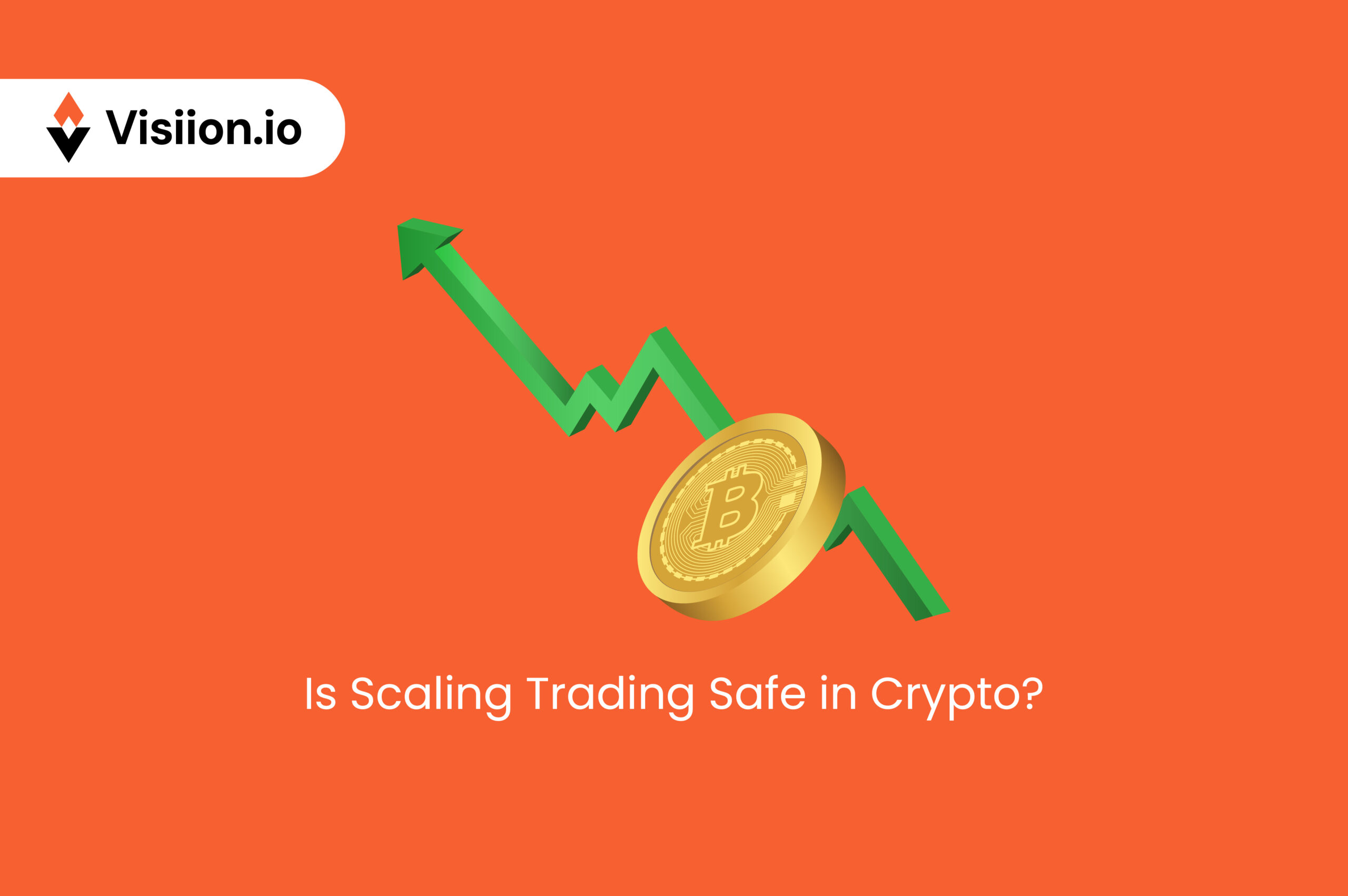Is Scaling Trading Safe in Crypto?
There are numerous crypto trading strategies that traders use to make a profit. One of the most popular among them is “Scalping.” Scalping is a hyper-fast trading tactic where crypto traders benefit from quick price movements in the asset. As cryptos are comparatively more volatile, they offer frequent trading opportunities.
Here, traders do not hold on to their positions for days or weeks. Instead, the trading happens in a matter of minutes or at max 1 or 2 hours. Traders aim for smaller but consistent profits. Over time, these small profitable trades add up and result in a big overall profit.
But if scalping is so effective and profitable, then why not all crypto traders who do scalp trading succeed? Well, that’s exactly the aspect that we will focus on in this blog. We will share with you some hidden risks related to scalping. We will also share some helpful strategies that can increase the likelihood of your scalp trades turning profitable.
So, without wasting much time, let’s get started.
How Do Traders Execute Scalping?
Scalping is all about precision, discipline, and exact timing. Scalp traders often have a pre-defined strategy for scalp trading. The first step is picking the right crypto for scalping. The crypto has to be one more liquidity like BTC/USDT or ETH/USDT. The reason for picking such liquid pairs is they have lower spreads. This means the chance of profitability is higher.
Then comes technical indicators. These indicators are the cornerstone of scalping. Traders deploy these indicators on the price chart and identify the right entry and exit points. For example, they use moving averages, RSIs, Bollinger Bands, and more. The trading platform also plays a critical role in scalping.
Traders often prefer hyper-fast trading platforms like Visiion.io to make sure their trades are executed in a blink. When you use such platforms, the latency remains minimal, and slippage is less, too.
Now comes the most important part: the strict entry and exit. Generally, traders use limit orders to make sure the entries and exits are executed at the right price. Rember, the entire game here is about perfect trade execution. If you miss the right opportunity, you miss the chance to make a profit.
Why Do Traders Prefer Scalping?
There are number of reasons why traders feel scalping is attractive. First of all, you don’t have to plan for the long term. You get quick results and don’t have to wait for weeks or months to see the results. Moreover, the market risks are minimal, too, as the trade’s exposure to the market is for a shorter duration. reduces the impact of overnight price swings and major macroeconomic events.
If you have enough experience and have aced trading, scalping brings up amazing potential and higher returns. If you execute your scalping trades in the right way, you can generate consistent profits. And the best part? Scalp trading gives you an opportunity in both the markets, bull and bear. But that’s only the bright side! But, like all trading strategies, scalping also comes with a lot of risks.
As these risks are not generally highlighted, traders often miss out on them. But hey, no worries. We are here to ensure this does not happen. We will highlight these hidden risks so that you can stay aware of them while executing scalping trades.
| Advantages | Disadvantages |
| Multiple trading opportunities daily | Requires constant monitoring |
| Small gains add up quickly | Mentally exhausting and stressful |
| Works in sideways markets | Limited scalability without high capital |
| Not trend-dependent | Increased slippage risk in volatile markets |
| Immediate strategy feedback | High competition reduces profitability |
| Flexible trading hours | Internet and platform stability are critical |
| Can exploit small market inefficiencies | Execution delays can ruin trades |
The Hidden Risks in Scalping Crypto Markets
Market Volatility and Unpredictable Price Swings
Volatility is the sword that cuts both ways. While it’s good as it brings in more opportunities, it comes with a great risk, too. For example, if you have a trade on the bull side, but the price drops suddenly before moving up, it will hunt your stoploss and you will lose the trade even if the final movement is on the upside.
High Trading Fees and Costs
This is especially true for platforms that charge higher trading fees. As scalping involves multiple trades in a day, the fees are higher. On top of that, the profit margins here are quite low compared to swing trades. So, trading fees impact the overall profit more. So make sure you use an affordable platform like Visiion.io and do a careful cost analysis before getting started.
Slippage and Order Execution Risks
Scalping requires precise execution, but market conditions can lead to slippage—where orders are filled at unintended prices. High-frequency traders may also face latency issues, particularly during peak market hours. Additionally, during times of extreme volatility, liquidity shortages can prevent traders from closing positions at favorable prices.
Emotional and Psychological Pressure
Scalping is an adrenaline-pumping game. And as it involves your hard-earned money, there is am emotional connection, too. You’ll have to make split-second decisions. Moreover, there is a high risk of impulsive and revenge trading. Some traders might have to take better control of their emotions while doing scalping. And most importantly, you’ll have to control your emotions. Have a rock-solid entry and exit protocol, putting all the risks aside.
The Role of Leverage in Exaggerating Risks
Leverage could be a good option for traders who want to multiply their profits with the same capital. The downside? You are exposed to the risks in multiples, too. Even a minor price movement against your trade can blow your entire trading capital. At Visiion.io, we do offer leverage for trading, but with caution. We regularly update and educate our traders on how to use leverage to minimize the risk.
Dependence on Technology and Automation
A lot of traders use trading bots for scalping. But this increases the dependence on technology. Trading bots can still malfunction and execute unintended trades. This can lead to higher risk of loss-making trades..
Regulatory and Exchange Risks
Not all exchanges support scalping strategies. Some impose trading restrictions or ban high-frequency trading outright, leading to potential account suspensions. Regulatory changes can also impact market conditions, requiring traders to quickly adapt to new compliance requirements. Furthermore, exchange manipulation remains a concern, with some platforms engaging in wash trading or artificially inflating order books.
How to Reduce the Risk In Scalping Trading?
The most important step to minimize the risk during scalping trades is to have an emotionless trading setup. You’ll have to create a setup where you execute the trades the moment it hits your pre-set prices. Whether it’s a stop loss or take-profit, both should be determined before entering the trade itself.
Another step is position management. You cannot go all in with a single trade. Make sure you allocate a fraction of your capital to one trade. As there will be multiple trade opportunities in a day, you must not fall for FOMO. If you make a mistake with your position, it can lead to a financial disaster from which you might not recover quickly.
The next important thing that you have to do is to limit your leverage. You can use it but with a limit. Do not overuse your leverage, as it can lead to a severe financial downturn. It’s also important to pick the right trading platform. While it’s good to use a platform that offers minimal trading fees, quality is also important. You cannot sacrifice the security, quality of service and liquidity.
As we mentioned earlier, emotional discipline is the key. You cannot take trades on a whim. Similarly, you can never profit from revenge trading. So avoid them at all costs. Stay away from impulsive and rash decisions.
While scalp trades are not affected by long-term events, macroeconomic factors still play a crucial role. Make sure you are tracking macroeconomic factors and news. Adjust your positions and strategies if needed.
Trading bots are a good tech that you can use for scalp trading. But it’s important that you are aware of the risks associated with them. Ultimately, human intelligence and emotions are more powerful than all AI out there (at least for now!) So, a wise thing to do is fuse tech and human intelligence to get the best results.
Wrapping Up
Scalping is a great trading system that can help traders make small but quick profits. But, like all other trading strategies, they do come with certain limitations and risks. Recently, there’s been a sharp rise in the number of traders adopting scalping trading.
Fast profits and leverage appeal to these traders. While it’s a good way to make money through trading, a proper trade setup, strategy, and emotional control are necessary. Traders have to stay aware about trading fees, emotional strain and leverage risk.
We hope this guide has offered you a clear insight into the scalping trading, its risk and what you can do to mitigate those risks. If you found this article useful, feel free to explore our social media platforms and other blogs. You will surely find a lot of helpful stuff there.
Till then, happy and safe trading!










